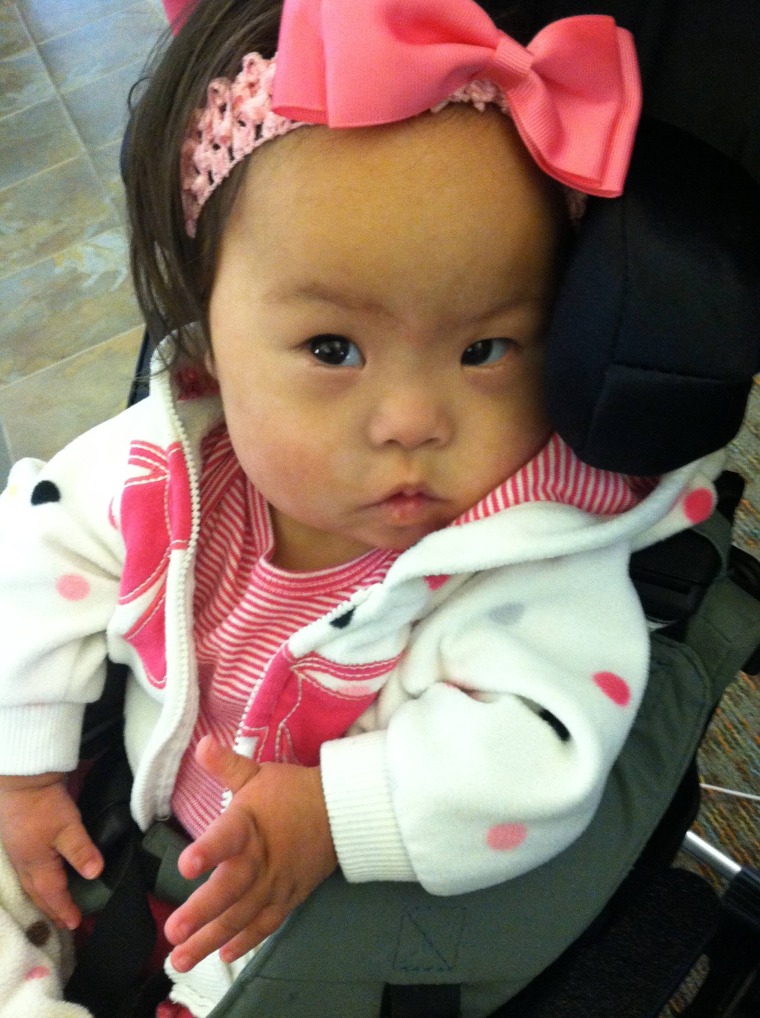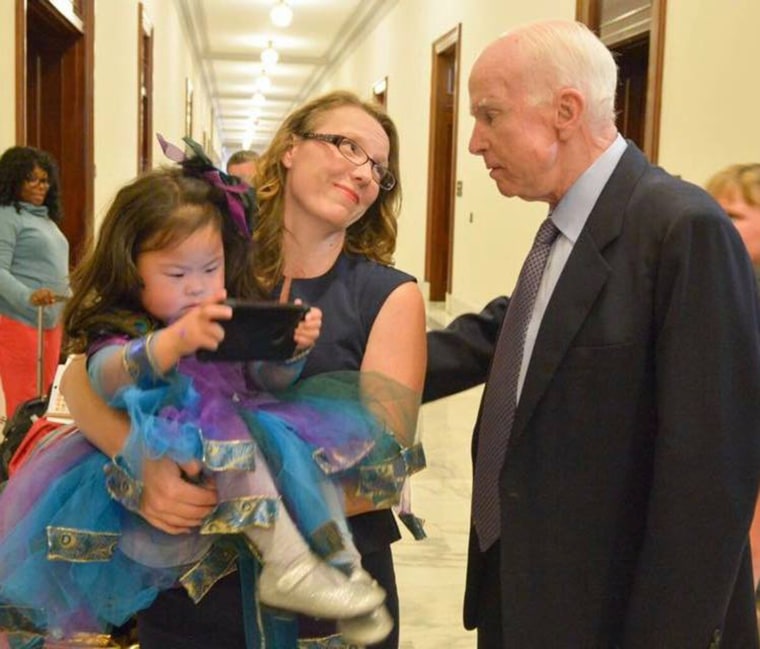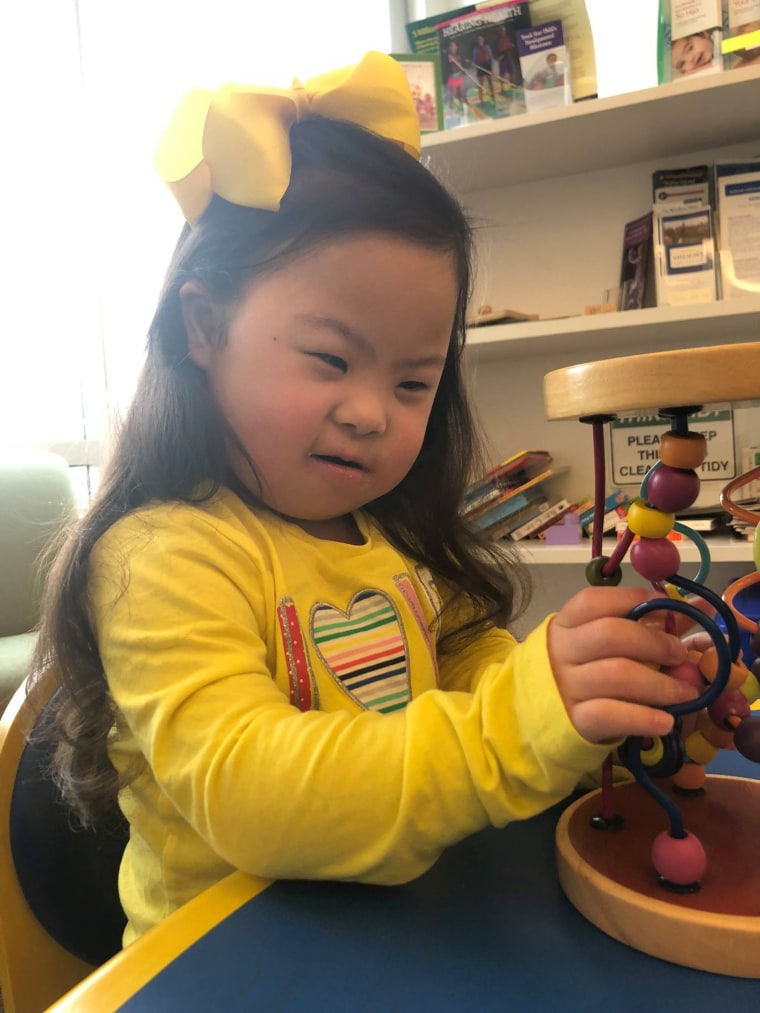After being dismissed by doctors, mom of child with Down syndrome makes a discovery
A new paper examines the relationship between Down syndrome and ketotic hypoglycemia all thanks to researchers “willing to listen to a mom.”Aug. 3, 2021, 2:25 PM EDT / Source: TODAYBy Meghan Holohan
Mom Austin Carrigg was concerned when her daughter Melanie never learned to hold her head up or sit up. When she asked doctors why, she always heard the same thing: Your daughter has Down syndrome. Still, Carrigg suspected that another condition caused Melanie’s developmental delays.
After a medical emergency and lots of advocacy, Carrigg learned her daughter had ketotic hypoglycemia, which leads to low blood sugar and caused some of her symptoms. While talking with families with children with Down syndrome, Carrigg often heard their kids had the same experiences.
“I just thought to myself, ‘What are the odds that this other little girl with Down syndrome, also has a blood sugar issue that my daughter does?’” Carrigg, 35, who lives outside of Washington, D.C., told TODAY. “I realized there had to be something there.”

Her hunch about the relationship between Down syndrome and ketotic hypoglycemia led to her working with researchers and being listed as a co-author on a recent paper on it, which appeared in JIMD Reports. The paper indicates that 7% of children with Down syndrome also have diagnosed or suspected ketotic hypoglycemia.
“It was never a question in the researchers’ minds as to whether I would be allowed to be involved,” she said. “That was the amazing part. They understand and value our voices even though we’re parents and not medical providers.”A mother’s instinct
As Melanie, now 8, became a toddler, Carrigg knew something was wrong. Melanie slept all day, struggled to hold her head up, sit or walk. Carrigg often asked doctors about Melanie’s behaviors, yet they often dismissed her.
“I remember taking her to a developmental pediatrician and saying, ‘I know something is very wrong and we’re here to see you because you’re the type of doctor who helps us figure out why she’s not meeting her milestones,’” Carrigg recalled. “He said to me, ‘She’s never going to walk. She’s never going to talk. I never need to see you again.’”

Carrigg was stunned. Children with Down syndrome have developmental milestones they meet but Melanie wasn’t. A terrifying emergency reinforced Carrigg’s resolve that Melanie was grappling with another health issue. During a visit with family in Arizona, Melanie became sick, agitated then unresponsive.
“She had thrown up once and then we couldn’t wake her,” she said. “When we could rouse her she would fight us. She was hitting and like pulling away. So we rushed to the ER.”
Melanie was in a coma from low blood sugar, but doctors had few answers. When Carrigg returned home, she was determined to understand what happened and met with a new endocrinologist. That’s when the frustrated mom pushed again for help and finally received it.
“I was done fighting and I laid out all of the low blood sugars and high ketones and said, ‘You have to do something. Something is very wrong,’” Carrigg explained. “I was like, ‘You have to do it now’ and she put in a referral to see a metabolic geneticist.”

The metabolic geneticist diagnosed Melanie with ketotic hypoglycemia, a condition that causes low blood sugar with ketosis.
“It was a relief,” Carrigg said. “The world was spinning because it felt so surreal. I finally know I’m not crazy. They’re finally going to help me help her.”
While it can cause scary complications, including coma, there is a simple treatment for it.
“You take cornstarch,” Carrigg said. “Believe it or not, that simple thing, cornstarch, maintains blood sugar.”
Soon after treatment began, Melanie started transforming.
Recommended
TOKYO OLYMPICSCartoon praises Simone Biles for putting her mental health first
HEALTH & WELLNESSAfter biopsy on nose, Hugh Jackman urges fans to get checked for skin cancer
“Within six months of being put on cornstarch she was walking,” Carrigg said. “Our kiddo who would sleep all day every day, didn’t sleep all day every day. She was awake and she was thriving and playing.”
Carrigg was thrilled to see her daughter enjoying life. As she spoke with other parents of children with Down syndrome she noticed that some of their children had similar symptoms.
“There’s too many of us who have children with Down syndrome who either sound like they have this — or it’s confirmed — for there not to be a connection,” she said.

Carrigg reached out to the Ketotic Hypoglycemia International, a patient group, to share her hunch. Executive director Danielle Drachmann connected Carrigg to the advisory board and the experts thought it was worth examining the suspected connection.
“That’s really how we got where we are today — somebody was willing to listen to a mom,” Carrigg said.A discovery
The researchers asked 140 participants with children with Down syndrome about symptoms to determine how often children with Down syndrome might have ketotic hypoglycemia. The findings indicate that 7% of respondents either have a diagnosis of ketotic hypoglycemia or symptoms consistent with it and this is the first paper to note a connection.
“We hoped not to see that Down syndrome patients had been overlooked for their low blood sugar. It is easy to diagnose once you have the suspicion,” Dr. Henrik Thybo Christesen, consultant in pediatrics, clinical professor Hans Christian Andersen Children’s Hospital in Denmark, one of the authors of the paper, told TODAY, via email.
His co-author Jacob Sten Petersen agrees the results are surprising, but said there could be several reasons why no one has noticed the connection.
“Since Down syndrome is such a complicated genetic disease with many different manifestations, some of which may resemble low blood glucose, this is probably why in the past (ketotic hypoglycemia has) been completely overlooked,” the corporate vice president of Novo Nordisk, a pharmaceutical company, told TODAY, via email. “This is an outstanding example of what patient organizations actually can do and that they, through citizen science, potentially can make significant scientific discoveries potentially changing the lives of thousands.”
Drachmann hopes that this leads to more researchers considering patient’s lived experiences.
“Take a minute and think about it: Where could we be in five years if the patient organizations, patients and caregivers were empowered to share their thoughts of correlation … and the medical experts were educated, encouraged and trained to engage in research projects with patients and their caregivers as equal stakeholders?” she pondered to TODAY, via email.

More research needs to be conducted to understand the relationship between ketotic hypoglycemia and Down syndrome. But this paper raises awareness that it could be a diagnosis for children with Down syndrome, especially if a patient has low blood sugar. Carrigg feels grateful that her advocacy resulted in help for her daughter — and others.
“They gave me my voice,” she said. “I’m her mom. I know her best … There’s this other team of doctors who valued my opinion and I was right.”

0 comments on “Some Children with Down Syndrome Suffer From Hypoglycemia”Add yours →